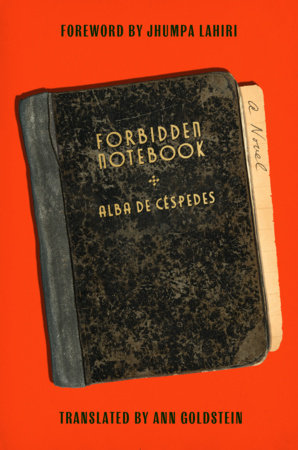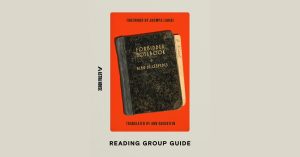—Bennard Fajardo, Politics and Prose Bookstore

A New York Times Notable Book of the Year
“Powerful.” —The New Yorker
“Brilliant.” —The Wall Street Journal
"Astounding." —NPR
“Forceful, clear and morally engaged.” —The Washington Post
“Subversive.” —The New York Times Book Review
"An exquisite, tormented howl." —The Financial Times
"Quick, propulsive, and addictive." —Los Angeles Review of Books
“Gripping.” —Minneapolis Star Tribune
“A remarkable story.” —Publisher’s Weekly (starred review)
“Wrenching, sardonic.” —Kirkus (starred review)
“As relevant today as it was in postwar Italy." —Shelf Awareness (starred review)
With a foreword by Jhumpa Lahiri, Forbidden Notebook is a classic domestic novel by the Italian-Cuban feminist writer Alba de Céspedes, whose work inspired contemporary writers like Elena Ferrante.
In this modern translation by acclaimed Elena Ferrante translator Ann Goldstein, Forbidden Notebook centers the inner life of a dissatisfied housewife living in postwar Rome.
Valeria Cossati never suspected how unhappy she had become with the shabby gentility of her bourgeois life—until she begins to jot down her thoughts and feelings in a little black book she keeps hidden in a closet. This new secret activity leads her to scrutinize herself and her life more closely, and she soon realizes that her individuality is being stifled by her devotion and sense of duty toward her husband, daughter, and son. As the conflicts between parents and children, husband and wife, and friends and lovers intensify, what goes on behind the Cossatis’ facade of middle-class respectability gradually comes to light, tearing the family’s fragile fabric apart.
An exquisitely crafted portrayal of domestic life, Forbidden Notebook recognizes the universality of human aspirations.
Book Details
"A literary monument—Elena Ferrante cites it as an influence, and readers will find strong echoes of Valeria’s voice and predicament in many of Ferrante’s stubborn and paradoxical heroines."
—Catherine Lacey, The New York Review of Books
"[Forbidden Notebook] moved me enormously."
—Leïla Slimani, The Guardian
"If you’re a Ferrante fan, you’ll likely love de Céspedes’ piercing prose, as it probes the inner lives of women searching for meaning in a patriarchal Italian culture and facing the distance between who they’ve become and who they’d like to be."
—Julianne McShane, A Mother Jones favorite book of 2023
"It is impossible not to be impressed by this important and beautifully translated book, as well as by de Céspedes’s masterful handling of so many complex interpersonal and existential subjects."
—Sunny Rosen, Current
"In the novel-diary, as in her advice column, De Céspedes undoes common-place assumptions and evokes a sense of radical possibility within a conventional format, and through familiar themes: the family, love, sex, relationships....De Céspedes’ account of the alienating, confining, tenacious force of the family endures."
—Eleanor Careless, The New Inquiry
"What she did – here and in her novels – was to combine intimate revelation about women’s bodily and emotional lives with a deep moral seriousness about the need for change within marriage as an institution and within women’s lives."
—Lara Feigel, The Guardian
"Over the course of this beautiful, wrenching, and delicately constructed novel, which is made up entirely of Valeria’s diary entries, a quiet revolution occurs."
—Natalia Holtzman, On the Seawall
"Forbidden Notebook’s pace is quick, propulsive, and addictive. Intimate, smart, and smoldering, newly translated by Ann Goldstein (noted for her translations of Elena Ferrante, herself a passionate reader of de Céspedes) and introduced by Jhumpa Lahiri, Forbidden Notebook joins a global canon of work by writers such as Clarice Lispector, Colette, Jean Rhys, Margery Latimer, Mercè Rodoreda, and Mariama Bâ, unapologetically restricting its focus to the world of traditionally feminine concerns—home, family, romance, the convulsive desire for a prettier hat—while subtly engaging political issues and capturing an almost mystical, transcendently luminous awareness."
—Joy Castro, Los Angeles Review of Books
"The urgency of de Céspedes’s elegant but unadorned prose — beautifully translated by Goldstein — gives the text a vertiginous and unnerving verisimilitude.... An inheritor of Virginia Woolf, de Céspedes’s novel anticipates the candid confessionals of writers such as Deborah Levy, Sheila Heti and Rachel Cusk.... Formally precise, psychologically rich, and suffused in suspicion and suspense, Forbidden Notebook is an exquisite, tormented howl."
—Lucy Scholes, The Financial Times
"Astounding . . . Forbidden Notebook does not feel 71 years old. Its prose is fresh and lively, and the issues it raises more contemporary than many would hope."
—Lily Meyer, NPR
"From the novel’s first line—“I was wrong to buy this notebook, very wrong”—the notebook is equally freighted with self-flagellating judgment and a burning, mysterious desire. Unbeknownst to her husband and children, Valeria begins to keep a record of her observations and feelings, first haltingly, then with increasing urgency and insight. Her practice of writing becomes one of shocking self-recognition, as she begins to reacquaint herself with the person she is—or could be—outside the restrictive role she plays in the family . . . it is the very smallness of “Forbidden Notebook’s” scope that makes it so powerful."
—Sarah Chihaya, The New Yorker
"The book has been newly revived by Ann Goldstein . . . Its voice remains lively and compelling, and the subjects depressingly perennial: the battle between motherhood and self-actualization; social control over women’s bodies; unpaid emotional and domestic labor; the forces of progress pressing up against the ceiling of convention . . . This is a brilliant, quietly tumultuous book and a welcome revival of an author too little known in the anglophone world."
—Toby Lichtig, The Wall Street Journal
"The voice seizes our attention at once: forceful, clear and morally engaged . . . It’s political in a wider sense, examining a form of suppression that women recognize as global: the suppression of their thoughts."
—Roxana Robinson, The Washington Post
"De Cespedes' work has lost none of its subversive force. . . . Forbidden Notebook promises a new cohort of readers, appetites whetted by the works of Elena Ferrante, Elsa Morante and Natalia Ginzburg. Goldstein, who has a particular skill for conveying the full power of a woman’s emotional register, for locating an undertow of wrath or grief even in stated ambivalence, has reinvigorated the text.”
—Joumana Khatib, The New York Times Book Review
"A gripping slow-burn of a book. Domestic mundanity and the impulse toward freedom combine in this critique of marriage, family and fascism . . . Valeria arrives at innumerable clear-eyed epiphanies regarding gender, class and the passage of time, many of them rather unpleasant. But one of de Céspedes' points seems to be that real liberation is never comfortable or easy — a fact which, if anything, makes that state of being all the more worth pursuing."
—Kathleen Rooney, Minneapolis Star Tribune
"Forbidden Notebook is a sly indictment of marriage and generational conflict, as relevant today as it was in postwar Italy."
—Michael Magras, Shelf Awareness (starred review)
"A fearlessly probing and candid look at marital dynamics and generational divisions, first published in Italy in 1952 . . . Goldstein’s translation invigorates a remarkable story, one that remains intensely relevant across time, cultures, and continents."
—Publishers Weekly (starred review)
"De Céspedes deftly charts the widening gap between Valeria's increasingly desperate inner life and the roles she feels forced to play in a feminist novel that consistently calls into question the ways its narrator makes sense of her claustrophobic domestic world. A wrenching, sardonic depiction of a woman caught in a social trap."
—Kirkus (starred review)
"Over the course of six months [there] are reflections on motherhood and femininity in postwar Rome that were as urgent and revelatory in the 1950s, when the novel was originally published, as they are today in post-Roe America."
—Jenny Wu, The Millions
"There’s a long tradition of fiction wrestling with mid-twentieth-century middle-class anomie, and it’s in this context that Alba de Céspedes’s The Forbidden Notebook can be neatly situated. But there’s also something about this book that feels furtive, including the title and the conceit behind it—i.e., that this is the record of a frustrated woman who’s been writing her thoughts in secret. It’s the kind of lively narrative in which part of the writer’s compositional skill is creating that sense of unpredictability, and the novel is all the stronger for it."
—Tobias Carroll, Words Without Borders
"A lost feminist classic to rival Penelope Mortimer’s The Pumpkin Eater and Betty Friedan’s The Feminine Mystique."
—Lucy Scholes, Prospect
"The writing sparkles with candour and self-awareness as Valeria navigates the tricky transitions of midlife. She can sense the fading relevance of her family roles, but her new self-identity is still a work in progress. The novel is written in this gap, which proves to be a rich seam of stoical insight."
—Ronan Hession, The Irish Times
"Here is a book that demonstrates, page by page, paragraph by paragraph, that writing really can be a transformative act."
—Rachel Cooke, The Guardian (UK)
"This devastating and brilliant novel, written by a remarkable woman, deserves to become a bestseller all over again."
—Claire Pettit, TLS
"Reading Alba de Cespedes was, for me, like breaking into an unknown universe: social class, feelings, atmosphere."
—Annie Ernaux, Nobel Prize laureate and author of The Years
"In her diary de Céspedes confides, “I will never be a great writer.” Here I take her to task for not knowing something about herself—for she was a great writer, a subversive writer, a writer censored by fascists, a writer who refused to take part in literary prizes, a writer ahead of her time. In my view, she is one of Italy’s most cosmopolitan, incendiary, insightful, and overlooked."
—Jhumpa Lahiri
"Devastatingly good."
—Joy Castro, author of One Brilliant Flame
"The absorbing and abidingly resonant confession of a woman's desire to do that most elusive thing: forge a self apart from her caring for others. Forbidden Notebook can also be read as an allegory of fascism, a post-Roe cautionary tale, and corroboration of the revelatory and exhilarating but also implosive power of honest words."
—Lisa Halliday, bestselling author of Asymmetry
"The insights Valeria gains as she writes are as intoxicating as they are painful, because they make her aware -- for the first time -- of the constraints of her own existence; rigidly delineated by morality, social anxiety and self-denial. A secret missive from a past that is not over yet. Ruthless, perceptive, suspenseful."
—Judith Schalansky, author of An Inventory of Losses
"A quiet book that only unfurls its full rage over the course of time. The novel's progressiveness, perhaps even its scandalousness, lies in its offhandedness -- especially if you consider the time in which it was written. How writing can become an outlet for freedom... how it can do so, without one even realizing it -- this is what Alba de Céspedes reveals, in clear, unobtrusive language, allowing readers to marvel, in the reverberations of her sentences, at how topical this book still is to this day."
—Nino Haratischvili, author of The Eighth Life


